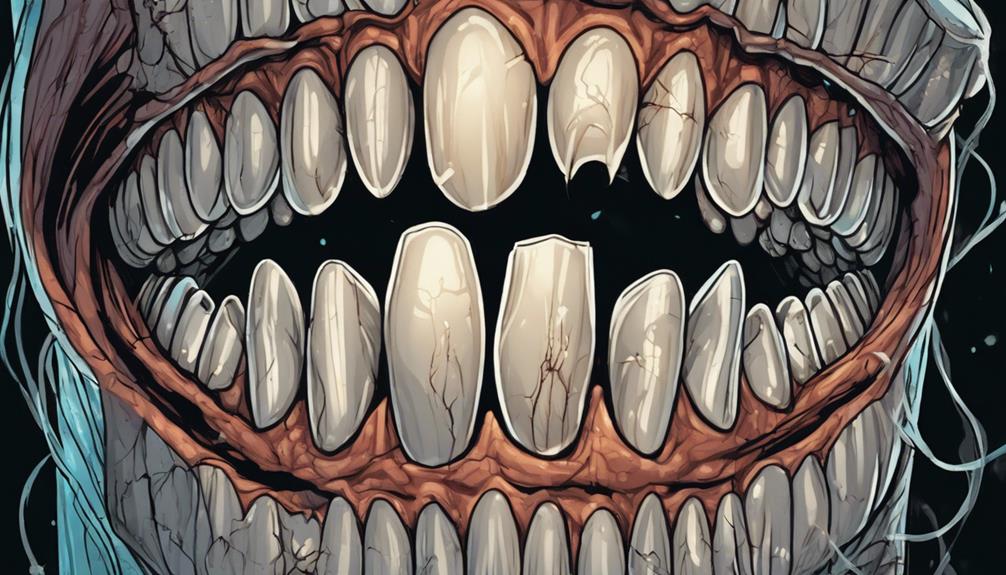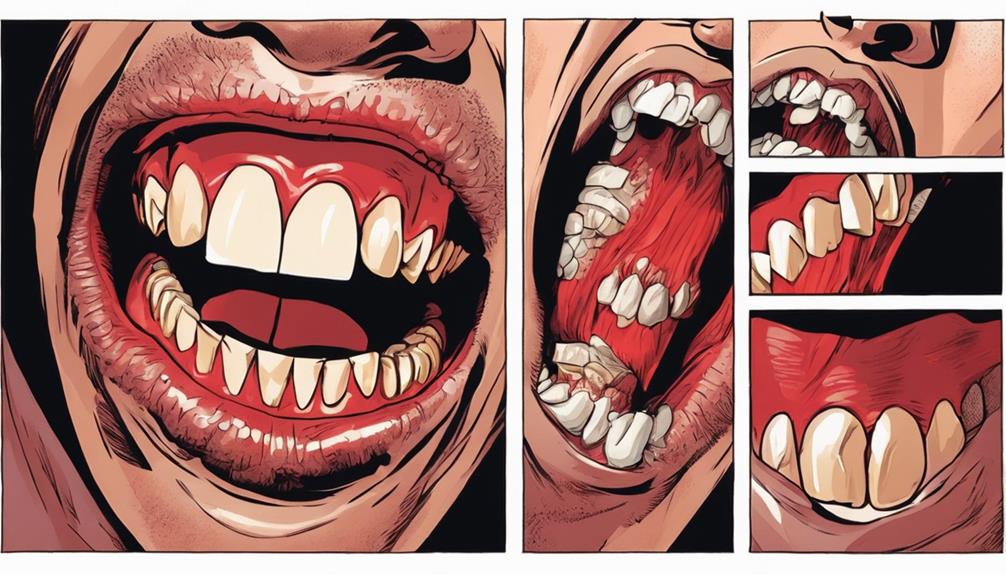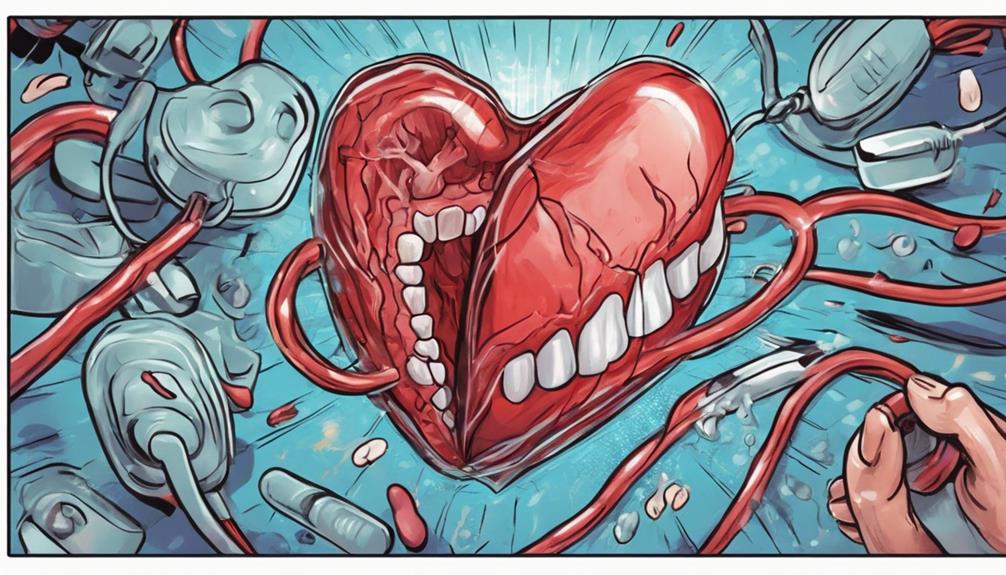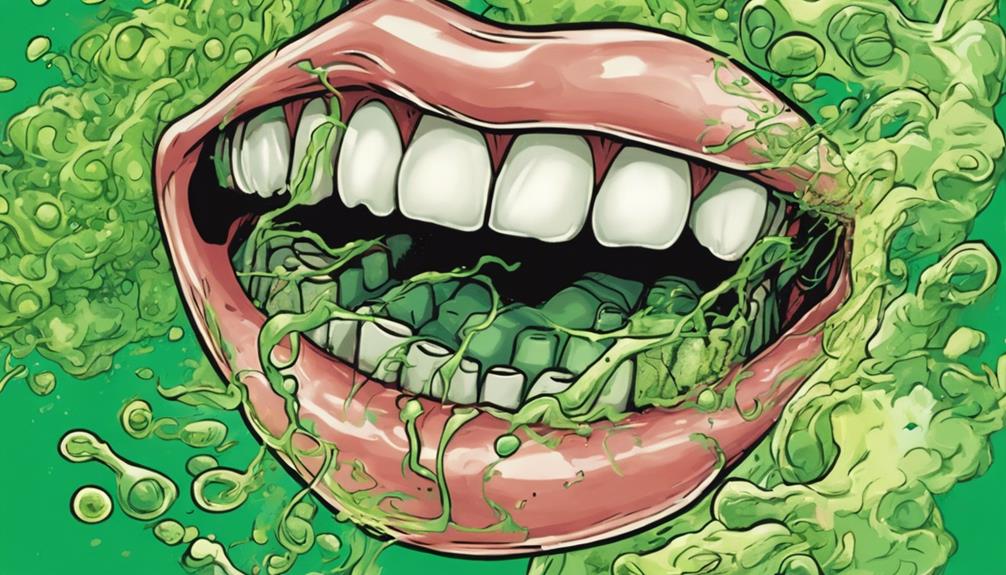You should never skip flossing because it puts you at risk for cavities, gum disease, and even heart issues. Toothbrushes can't reach the tight spaces between your teeth, allowing plaque and food particles to build up. This buildup creates an ideal environment for harmful bacteria, leading to conditions like gingivitis and periodontitis. Plus, poor oral hygiene can increase your chances of cardiovascular disease. Regular flossing not only protects your teeth but also keeps your breath fresh and enhances your smile's appearance. Stick around to discover more reasons why flossing is essential for your oral health. Additionally, inadequate dental hygiene has been linked to a greater risk of headaches and migraines. The inflammation and infection caused by gum disease can trigger chronic headaches and make existing headaches worse. Taking care of your oral health can have a significant impact on reducing the frequency and severity of headaches. So, don’t forget to include flossing as part of your daily dental routine to help prevent not only cavities and gum disease but also potential dental health impact on headaches.
Key Takeaways
- Skipping flossing increases cavity risk due to plaque buildup between teeth that toothbrushes can't reach.
- Neglecting to floss can lead to gum disease, which may result in serious conditions like gingivitis and periodontitis.
- Poor oral hygiene from skipping flossing is linked to a higher risk of heart disease and cardiovascular issues.
- Regular flossing improves tooth appearance by preventing plaque buildup and maintaining a uniform tooth shade.
Increased Risk for Cavities

Skipping flossing can lead to a higher risk of cavities as plaque builds up between your teeth, where toothbrushes can't reach. When you neglect to floss, food particles and plaque accumulate in those tight spaces, promoting tooth decay. A toothbrush alone isn't enough to tackle these hidden areas; that's where regular flossing comes in.
Using dental floss effectively removes plaque and debris that contribute to cavity formation. Studies show that individuals who incorporate daily flossing into their dental care routine experience fewer cavities than those who don't.
Higher Chances of Gum Disease

Neglecting to floss not only increases your risk for cavities but also heightens your chances of developing gum disease. When you skip flossing, plaque builds up between your teeth and along the gum line, creating an ideal environment for harmful bacteria.
This accumulation can lead to gingivitis and periodontitis, two common types of periodontal diseases that can wreak havoc on your dental health.
Brushing alone can't reach the tight spaces between your teeth, making flossing vital for maintaining good oral health. Regularly removing plaque through flossing prevents bacterial buildup and keeps your gums healthy. If left untreated, gum disease can result in tooth loss and has long-term consequences for your overall well-being.
Studies show that individuals who don't make flossing a habit are at a considerably higher risk for developing gum disease. By incorporating flossing into your daily routine, you actively protect your teeth and gums from potential infections and inflammation.
Connection to Heart Disease

Flossing plays an essential role in your overall health, as poor oral hygiene can greatly increase your risk of heart disease.
Research shows that individuals with periodontal diseases face a 19% higher chance of developing cardiovascular disease. When you neglect your dental care, bacteria from infected gums can enter your bloodstream through tiny blood vessels, potentially leading to hardened arteries. This connection between oral health and heart health is significant, making good oral hygiene vital.
Regularly flossing helps reduce the buildup of bacteria near your gums, lowering the risk of gum disease and its associated cardiovascular complications.
The American Heart Association emphasizes the importance of maintaining good oral care, as it directly impacts your heart health. By taking the time to floss daily, you not only protect your gums but also safeguard your cardiovascular system.
Neglecting to floss can lead to more than just tooth loss; it can put you at risk for serious health issues, including heart attacks and strokes.
Impact on Tooth Appearance

Regularly using dental floss keeps your teeth looking their best by removing plaque and food particles that can dull their appearance.
Daily flossing is essential for maintaining the health and aesthetics of your smile. When you make sure to remove plaque from those hard-to-reach spots between your teeth, you help prevent a yellowing effect caused by accumulated debris. This simple act of care for your teeth considerably enhances your overall oral hygiene.
Consider the following benefits of daily flossing:
- Uniform Tooth Shade: Flossing maintains a consistent color by preventing dark edges.
- Whiter Smile: Clear spaces between your teeth enhance their brightness.
- Enhanced Confidence: Clean teeth lead to a more attractive smile, boosting self-esteem.
- Improved Social Interactions: A visually appealing smile can positively impact your interactions.
Causes Bad Breath

Trapped food particles between your teeth can decay and create unpleasant odors, leading to bad breath. If you don't floss regularly, these particles can accumulate, allowing bacteria to thrive near the gum line. This buildup contributes to halitosis, making it vital to incorporate flossing into your daily oral hygiene routine.
Flossing helps keep your mouth healthy by removing debris and plaque that your toothbrush can't reach. By tackling these food particles, you're not only improving your breath but also aiding in the management of periodontal diseases, which can worsen if neglected. When you brush and floss, you're effectively minimizing the risk of bacteria producing foul smells.
Consistent flossing is important for maintaining fresh breath. If you skip it, you risk persistent bad breath due to the buildup of food and bacteria. Remember, your oral hygiene habits directly influence the quality of your breath.
Frequently Asked Questions
Why Is Not Flossing Bad for You?
Not flossing's bad for you because it allows plaque and food to build up between your teeth, increasing your risk of cavities, gum disease, bad breath, and even impacting your overall health and smile appearance.
Do Dentists Still Recommend Flossing?
Even a painter needs all their brushes to create a masterpiece. Dentists still recommend flossing, emphasizing its role in keeping your gums healthy and preventing cavities, ensuring your smile stays bright and vibrant.
Can You Still Have Healthy Teeth Without Flossing?
You can maintain some level of oral health without flossing, but it increases your risk for cavities and gum disease. Regular flossing helps remove plaque between teeth, promoting better overall dental hygiene and preventing future complications.
Do I Really Need to Floss Daily?
Imagine a knight battling plaque dragons; you really need to floss daily. It shields your teeth from cavities and gum disease, keeping your smile strong and your breath fresh. Don't let those dragons win!
Is Salt Water Rinse an Alternative to Flossing for Dental Hygiene?
While salt water rinse can be a helpful addition to oral hygiene, it is not a complete alternative to flossing. Flossing helps remove plaque and food particles from between teeth that rinsing alone cannot reach. To maintain optimal dental hygiene, it’s best to floss and rinse with salt water daily.
Conclusion
So, next time you're tempted to skip flossing, think about what's at stake.
One missed session could open the door to cavities, gum disease, and even heart issues lurking just beneath the surface.
Imagine facing the mirror and seeing not just plaque, but the beginnings of bad breath and a less-than-perfect smile.
It's a slippery slope, and you don't want to find yourself at the bottom.
Your teeth—and your health—deserve that extra minute of care.









